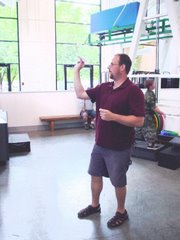I don't know if they will make the final cut. I don't know if the amalgam of moments will work, but since writing about teaching usually sounds like airy cool-whip generalities (all the same and all bland), I hope this is acceptable risk.
“Line up in a circle!” The first year students in my foundation seminar (or the seniors in an Organization Change class) pause, look puzzled, and then shuffle with the studied aloofness of adolesence that they have not quite yet shed into something a misshapen ellipse. A simple game follows. I ask students to describe what they have been doing in one word. “Weird. Fun. Chaotic. Unexpected.” These are typical responses. “How is your learning Weird? Unexpected?” They loosen up. They share a story of how they discovered an unspoken norm in the last place they worked. We shift back to our seats. I praise the day’s discussion leader for her astute questions. I ask them: “You are a new manager at an advertising firm. Is it better to have four links to four clusters of four people, or sixteen to links to everyone?” They discuss both in terms of ideas of centrality, effectiveness, and information redundancy using the day’s readings. I continue: “How could we discover which is better? What kinds of questions would you ask?” We record their responses on the board and post them later on a class forum so that they can use these ideas as they pursue their final research or service-learning projects.
In this amalgam of moments from my classes, I am illustrating the three guiding principles of my teaching. These are: the wisdom of social science, experiential cycles, and building a community of learners. To “line up in a circle,” throws my students off-guard. They pause on the way to complying. In a minute way, the pause throws into relief the ability to take the flow of experience, language, and influence that permeates our normal existence and to hold those moments, large and small, at arm’s length. To be in and out of the moment simultaneously is, for me, one of the delights of knowing the wisdom of the social sciences. I point my students towards the unexpected and with readings, movies, activities, humor, or provocative questions.

2 comments:
I like how informal your descriptions of your class are, but am a little suspicious of the little surprises in the second paragraph. How do you suppose these unanticipated moments change the scores on the course evaluations you receive?
Suspicious of what?
I think the unexpected moments lead to comments like "Interesting material, but course is disorganized."
Post a Comment